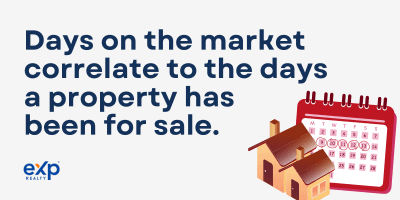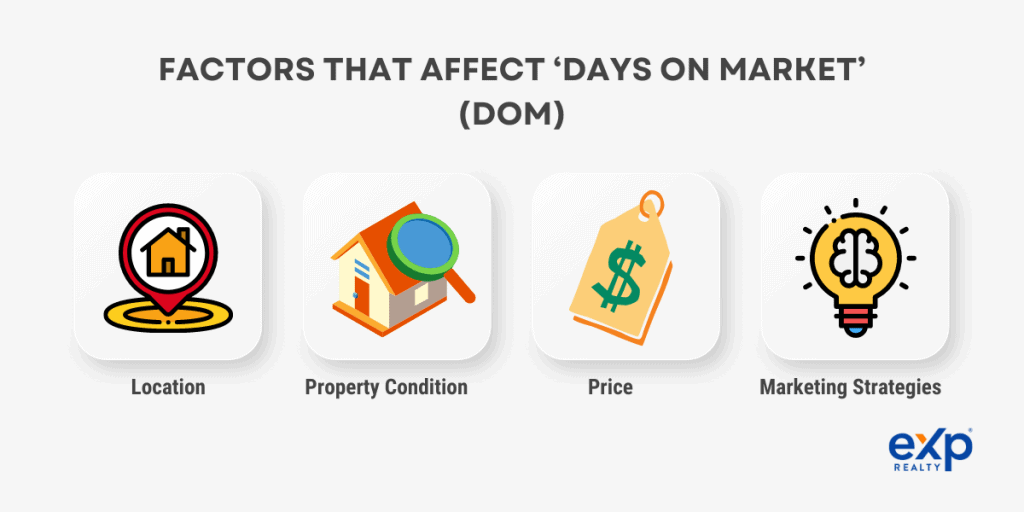Whether buying or selling your home, you must understand how the days on the market may affect the transactions.
Days on the market is critical information you can get specifically from a real estate agent.
Once you understand DOM, you’ll receive valuable insight into the real estate market. Many homebuyers, homeowners, and sellers use this calculated term to provide information and make informed decisions.
What Is ‘Days on Market’ (DOM)?

Days on the market correlate to the days a property has been for sale.
Typically, the time frame starts the day it is listed. Then, the number increases until the day it’s taken off the housing market or goes under contract.
Also, the term days on the market refers to the number of days a home has been on the market when listed by a specific real estate agent.
How Is ‘Days on Market’ (DOM) Used?
Days on market can give people an advantage during buying or selling.
For Homebuyers
Homebuyers use the days on the market phrase to properly understand the real estate market.
DOM helps home buyers understand the following information:
- Demand for properties
- Level or competition
- Market conditions
- Pace of sales
The information above lets homeowners decide when and where to buy a property.
For Homeowners
The days on the market are different for homeowners.
The best way for homeowners to use days on the market is when preparing for a sale. DOM provides insight into current market conditions, especially in your area. Once you know how many days other houses are on the market, then you can determine a competitive asking price.
A competitive asking price in the market helps homeowners evaluate the value of their homes.
For Sellers
The days of the market for sellers combine the uses for both homebuyers and homeowners.
Similar to homeowners, understanding DOM helps sellers evaluate their homes and set a competitive asking price. In addition, the DOM gives sellers an insight into market conditions and demand for properties in the area.
Days on the market allow sellers to enhance or change their selling strategy. For example, a seller may need a price reduction if the market demand isn’t doing well. You can adjust your ideal price according to the market demand and conditions.
Factors That Affect ‘Days on Market’ (DOM)
Multiple factors affect the days on the market. We’re giving you the top four factors that affect the DOM.

Location
A property’s location has the most significant impact on its DOM. For example, the housing market contains high-demand areas throughout the country. As a result, the market time in these high-demand areas has a shorter DOM.
Property Condition
A property’s condition impacts the days on market calculation. Well-maintained and updated properties are in high demand potential buyers.
We’ve found that better conditioned houses on the housing market correlate to a shorter DOM.
Price
A property’s list price provides a great shift in its DOM. The ideal price impacts the days on the market because some competitive prices affect the housing market.
Homebuyers, homeowners, and sellers use the days on market calculation to determine which competitive prices work best with the housing market. Ideal prices on properties are traditionally the most competitive.
However, prospective buyers use the days on the market to understand the housing market. Finally, competitively priced houses are known for having a shorter DOM and rarely see the need for price reductions.
Marketing Strategies
Homebuyers, homeowners, and sellers can use effective marketing strategies to identify potential bargaining demands. Likewise, sellers use DOM and effective marketing strategies to attract more prospective buyers.
Also, sellers use crucial metrics to generate more interest in a property.
How To Reduce ‘Days on Market’ (DOM)
You can learn to reduce ‘days on the market’ once you’ve understood the four factors that affect ‘days on the market.’
First, you can improve your property conditions to help reduce its DOM. For example, many sellers repair and update furnishings to attract more prospective buyers.
After updating a property, many sellers relist their home with a new agent, which resets the number of days on the market.
In addition, correctly pricing a property is another way to reduce its DOM. A list price depends on calculating key metrics, including market conditions and market demands. If you price your property correctly, you’ll lower its DOM and avoid any price reductions while on the market.
Finally, you can implement effective marketing strategies to help reduce DOM.
Here are a few marketing strategies you can use throughout the real estate process:
- Advertisements
- Professional photography
- Virtual tours
By implementing effective marketing strategies, improving property conditions, and fixing pricing, you can sell your property to the most interested.
Key Takeaways
All parties involved in the real estate process need a deep understanding of DOM to ensure that a property doesn’t spend too much time on the market.
As you can see, ‘days on the market’ is a metric that measures the amount of time a property has been on the market. Many factors affect the DOM, and its calculation is useful in the real estate process.
FAQs
Here are related questions and answers to anything you might be wondering about:
What does days on the market mean in real estate?
In real estate, days on the market means the number of days a property has been listed on multiple listing services. The days stop counting once a seller accepts an offer.
Is 50 days a long time for a house to be on the market?
Fifty days isn’t a long time to have a house on the market. Generally, you want to have an offer between 50 and 75 days.
What are days on market vs. cumulative days on market?
While days on the market refer to the days a property has been listed, cumulative days on the market refer to the number of days a property was listed on MLS regardless of a particular realtor.
Why would a house be on the market for over 100 days?
Here are a few reasons why a house would be on the market for over 100 days:
- Deals fell through
- Overpricing
- Previous offers denied
- The seller won’t budge on the price
What is the slowest month in real estate?
Traditionally, the slowest months in real estate are between November and February.
Conclusion
Now that you know what days on the market means, you can contact a real estate agent and start buying or selling your home with a trusted professional.
You can sign up to get alerts of new properties, including houses and condo listings, when they come on the market. Search for properties and contact a local eXp agent to get started.
If you’re looking to know how many days a home has been on the market, ask your real estate agent for more information.





